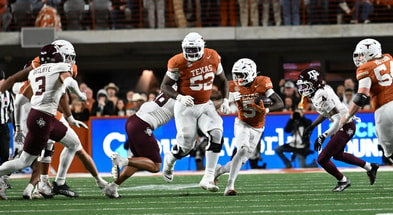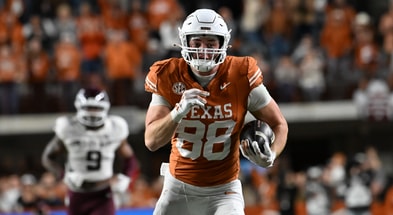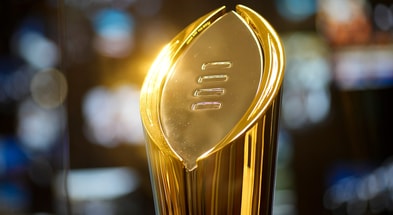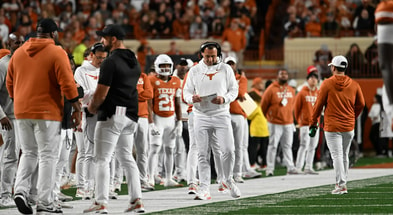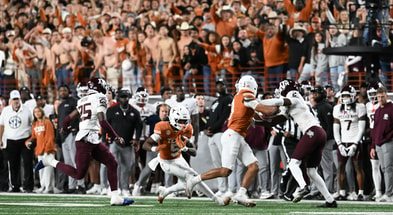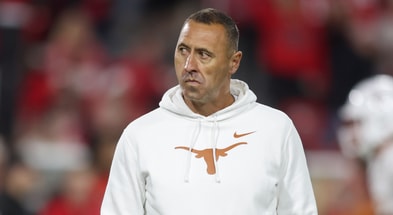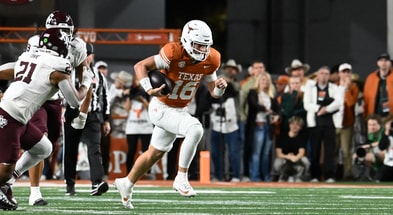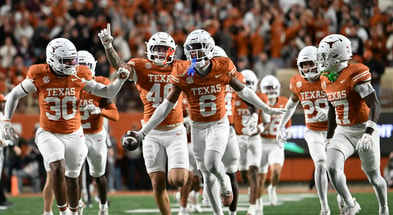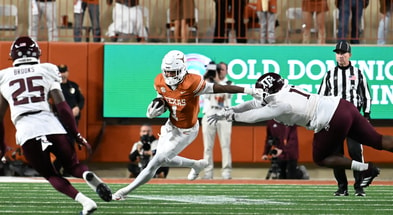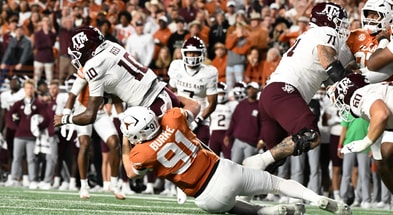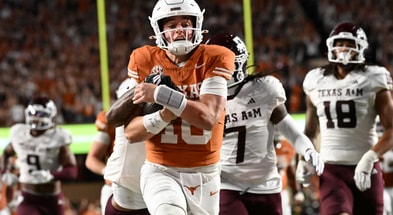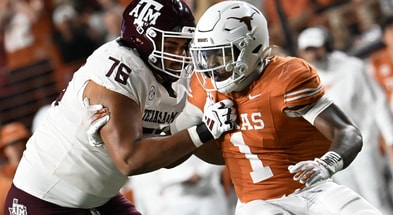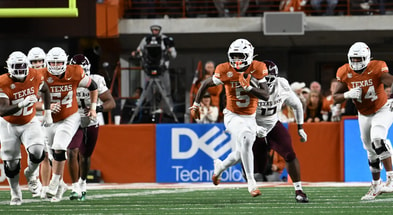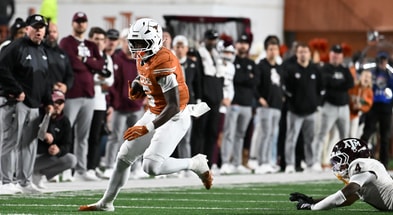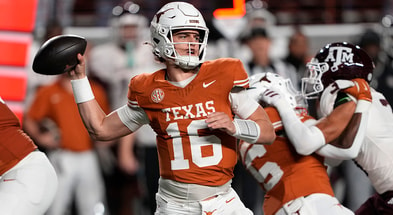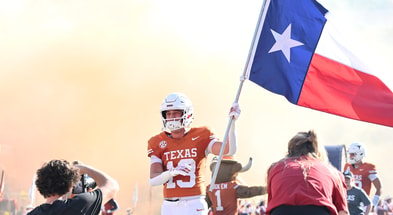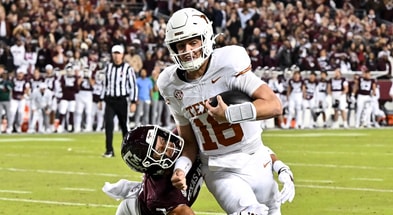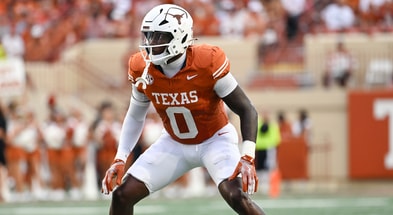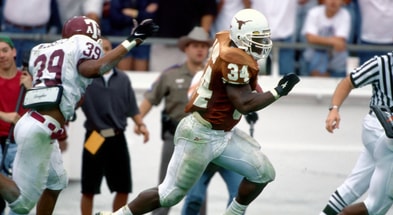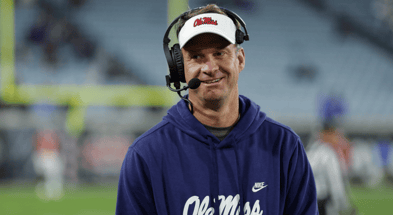Everything Washington OC Ryan Grubb said at his Thursday press conference
The No. 2 Washington Huskies head into their College Football Playoff game with one of the best offenses in the nation. Before their tilt with the No. 3 Texas Longhorns in the Sugar Bowl on New Years Day, UW offensive coordinator Ryan Grubb spoke to the media on Thursday.
[Join Inside Texas and get ONE MONTH of Longhorn intel for just $1!]
Q: Wondering if you can tell me the worst road trip in the Great Plains Athletic Conference? And why you guys’ coaching has been able to translate up levels from there?
Ryan Grubb: “Well, the worst one was probably my first one. I just didn’t know the mode of operations. So we were going to Nebraska Wesleyan, and we stopped for the pregame meal, which was at a park, and we pulled the coolers out of the bus and had sandwiches before the game. So I was like, wow, this is intense. No, they were all great. I enjoyed all of them. I think as far as your question, the translation piece is, you know, we’re mentors and teachers first. And I think that the better you can be at filling in gaps and doing the best with the resources that you have, regardless of where you’re at — if you’re at the New York Jets or Washington or University of Sioux Falls, it doesn’t matter. I think you always want to make the most of what you have and try to do a great job with the resources that are available. And make everything about the players and the people. And I think that that translates, no matter where you’re at.
Q: What’s the dynamic of being the play caller for a guy who has made his reputation as a play caller? Obviously, you and Kalen [DeBoer] have worked together for a long time. But what’s it like calling plays for somebody who has called plays?
RG: Well, I think it depends on the relationship. It can be a little bit brutal or it can be awesome. And mine definitely would be the latter. I think that part of that is the relationship that you have with the person you’re working with can be either that of a sounding board or a critic.
I think Kalen’s always been good at that. And obviously, long before I was calling plays, I was sitting in that room with him as his sounding board. So prior to being the coordinator, Kalen and I working together, coming up with solutions and thinking of ideas and ways to be creative offensively. And I think that relationship has just stayed status quo. So I’ve always felt the ability to stay creative and things like that. Not worry about the critical part. Only that there would be just a constant flow of information of: Hey, I see this, I see that. And then just knowing that he doesn’t have to have the pressure of doing that; that there can be trust both ways as far as letting me take care of the offense. There’s a lot, obviously, that Kalen has to tend to. So I think there’s a lot of freedom in it.
Q: Your offensive line won the Joe Moore Award. What’s the significance of that, really? And tell me how good your offensive line is.
RG: Yeah, I think the significance part is it’s one of the most unique awards. I don’t think our guys get too high or low based on certain awards. But that being a group award, especially that’s kind of the team within the team, the dynamics you have to have within the offensive line unit make it very special. And that group or that unit has had to overcome a lot of injuries throughout the season. So to stay together and turn into a really good unit, I think, says a lot for the room and Coach [Scott] Huff and what they have been able to accomplish. I think they’re very athletic. I think they’re smart. I think they’ve learned to be resourceful with some of the situations they’ve been put in. And I think they’re still hungry. I think they still think they can play their best game yet.
Q: So many playmakers in this offense, but I wanted to ask about Jack Westover, guy who has been there for a long time, former walk-on. What makes him a different dude from a personality standpoint? But also, what he brings. And I’m curious, when you came in two years ago, did you have a sense of who this guy was and what he could do? Or was there a point where he showed you what he was capable of?
RG: That’s a great question. I think Jack’s been showing us the breadth of his playing style. He just is so versatile. And that was one of the things that stood out right away with Jack, his athleticism and all the different things that he could do on our offense. That was something that, in our system, we always feel like guys like that can have a role and find ways to be productive within our system. And Jack, you know, to his credit, because of how bright he is and just a really astute football player, has been able to maximize that role, and just show his ability to continue to find different ways to utilize him. I think that says a lot to both his intelligence and just his savvy as a football player.
Q: What makes Rome [Odunze] such a good receiver? And how vital is he to the Washington offense?
RG: Rome is obviously very vital. And I think that one of the things that always shows up on any good team is in critical and big moments, your best guys have to step up and make big plays. You could go down throughout the season, and Rome has made those plays on almost every single week. So as far as what makes him special, I think Rome is never satisfied. I think he’s a guy that truly feels like his technique can be better. How he runs the route can be better. The separation can be better. He can understand the concept more. Again, another guy, extremely blessed to have within our system. He’s incredibly bright.
One of the smartest receivers I’ve ever been around. And he’s physical, tough, wants to be out there every day, grinding, trying to get better. He’s a phenomenal kid and I think he’s going to be really, really special on Sundays.
Q: One of the things that’s changed college football a lot, in a way that fans may not see, is the rise of, NIL collectives. Can you explain how much those have changed the way the game works and the way recruiting and retaining works? And how are you trying to take advantage of that to make this team better; make this team what it is?
RG: You said 15 minutes, right? Okay. There’s a lot to that. One of the things I would say that I think from a positive side, I’ve seen definitely more good than bad. I’ve seen kids in families that have had resources to be able to have families travel to games that would not have been able to send money back home.
Things like that. We’ve been really fortunate with some of our guys that make more money that have done it very responsibly and not been any different. When you look at Troy Fautanu, Michael Penix, Rome Odunze, Jalen McMillan, those guys have been the same guys. It has not changed them one bit — other than benefiting them to be able to think about: Do I want to be a late-round draft pick or come back and try to improve my stock and be a higher draft pick and utilize NIL to make the most of my talent? So I think there’s a piece there that can be really valuable. But honestly, the changing landscape is literally monthly, almost. And I think about when Michael [Penix Jr] came to Seattle.
You know, there was talk of what University of Washington would do, A collective and all these things. And now just to see how much it’s changed and grown and, obviously, Michael has reaped the benefits of that for sure. And he’s earned it. But it is so much different now. So I think when people talk about money as the first thing that they want to know about with your program and things like that, I think that attendance can go up a little bit. But I don’t think you can back away from the conversation and just try to be part of it. Evening the playing field and trying to figure out ways to understand what the maximum amount would be, and making that level for all the teams would be the logical thing. But obviously, free enterprise is free enterprise. And you certainly want these kids to be able to get everything that is possible.
Q: Coach, I was wondering, why are so many coaches loyal to Coach [Kalen] DeBoer over the years? Yourself, Chuck [Morrell]. I know you’ve had opportunities to go elsewhere, at quote — unquote, bigger schools, but what makes Kalen special to work for him?
RG: Yeah, everybody probably has a different answer for those things. But I think when you’re looking at wherever you’re working, you want to be somewhere where, number one, you feel like you can make an impact. Where you can be yourself. And those were things that were important to me.
Top 10
- 1Breaking
Mark Stoops
Kentucky to fire head coach
- 2
Pat Fitzgerald
Returns as Big Ten head coach
- 3Hot
Lane Kiffin
Statement on LSU, Ole Miss
- 4Trending
Pete Golding
Hired as Ole Miss head coach
- 5
Jon Sumrall
UF expected to hire Tulane HC
Get the Daily On3 Newsletter in your inbox every morning
By clicking "Subscribe to Newsletter", I agree to On3's Privacy Notice, Terms, and use of my personal information described therein.
My style of offense and the things I wanted to accomplish, that I didn’t want a bunch of restrictions on that. And I wanted to be able to be more collaborative with the people I was going to be with and have more control of the situation. I feel like I do have a lot of input with what happens with the program.
So at that point, especially last season, I just really felt like, you know, everything that we had invested with the players and the kids that we had coming back, the talks I had with those kids, like Troy [Fautanu] and Rome [Odunze] and Michael [Penix Jr] just trying to get those guys to stay and be part of it for another year was important. And then as far as Kalen, I think you just always want to work with people that you know you’re growing. And I felt like I was still in a position of growth. And that was going to continue to happen if I stayed put.
Q: I had a chance to stand next to (Texas player) T’Vondre Sweat this morning, and he’s the largest human being I’ve ever seen. I stood next to your center, Parker Brailsford, there’s about 100 pounds difference there. What do you do with a guy like that?
RG: You got to block him. You got to keep bodies on him all the time. And you have to try to wear him out. He’s a talented, athletic player. I’ve said this before. I think they’ve got great front players, but I’m always amazed with how well the front is coached. I think Texas does a phenomenal job with the technique, and how hard those guys play, but they don’t play the whole game. So I think trying to wear them down a little bit and get our guys to have the right mindset and physical mentality to just keep them moving and try to wear them out.
Q: You had the opportunity to take the job at Alabama, but chose not to. How satisfying is it for you to not only reach the College Football Playoff with Washington, but doing it alongside Coach [Kalen] DeBoer?
RG: Yeah, very satisfying. I think regardless of other opportunities, I think this was the reason I came to Washington. And I know when Kalen [DeBoer] and I first started talking about him taking that job, and if I would go with or not, my response was pretty quick to accept the position, just because it wasn’t necessarily the onset of my career, like, hey, this is exactly what I’m going to do, I’m going to be a Power 5 coordinator, that wasn’t the trajectory at the beginning. But as the career wears on and you start to see exposure to different levels, specifically Division I, and you start seeing why your system and your culture can be really special, I was excited to be able to put it on the biggest stage. And I felt like our system would work almost anywhere — just how we relate to people and get the culture right within the locker room, that big things were possible.
Q: When you guys got to Washington, what was your philosophy on recruiting your current roster? Mining the portal? And sort of shopping for a quarterback? And what did that process look like landing on Mike [Penix Jr]?
RG: Well, the recruiting right away was very busy. I spent the better part of the first ten days recruiting Rome Odunze and Ja’Lynn Polk. And they were all going in the portal. And not in a bad way. I mean this, because they were confused. They were going on their third head coach. And they just wanted to get it right. So sitting down with those guys and a multitude of other players when it was really just Kalen and I in Seattle — right away, the first part of December was really just Kalen and I in Seattle, talking to guys, meeting them, spending time. And then really, just like you were saying, recruiting them. Sitting down, showing them how the offense has worked over the last 15 years. How we utilized different receivers Backed by stats. And just watching film with them and then just getting to know them. And I think that part allowed us a door to be open to begin the relationship. My only request to the guys was let’s just go through this and work at building this relationship. Because you can’t walk into a room and instantly have a relationship. We have to work on it. As long as we can have a little bit of trust and see if we can get this thing rolling a little bit, we’ll be great. So those guys were very open to that process and did a great job of buying in right away once we got rolling.
And as far as the quarterback, when I got there, there were two scholarship quarterbacks there, Sam Huard and Dylan Morris. I met with those guys right away. I told them that we can’t be the championship program with two scholarship quarterbacks, and I would be bringing at least one quarterback in to compete with them. And at that point, Michael [Penix Jr] was not in the portal yet. Once he got in, felt pretty strongly that he was going to be a guy that would not only fit in our system, but excel. And really, we just had to find a way to keep Mike healthy. So his first winter with us was his first year that he had had an offseason since he was at Tampa Tech. So I think that first winter was really the platform and the catalyst for Mike starting to have the success that’s he’s had the last two years.
[Subscribe to the brand new Inside Texas YouTube channel!]
Q: I know you’re caught up in the moment right now, but how much thought, discussion, have you and the staff, maybe the players, given toward next year when you make the move to the Big Ten? And what’s it going to take to keep Washington on top like you are right now?
RG: That’s a great question, and it is hard to balance that out. Right now, it’s tough to see the forest through the trees. But obviously, recruiting and roster management and future thought play into every week. So we certainly have those discussions. I think our footprint will still be on the West Coast recruiting and getting the best players out there. We’ll dip in where we need to and get the Dylan Johnson’s out of Mississippi when necessary.
But as far as us, you know, how it plays out, we’re just excited to be playing some of the best teams in the country on a weekly basis. For us, I don’t think it changes who we are or what we do. But continuing to be relevant in the top five, top ten discussion is something that everything we do — from how we operate in the offseason to the type of people we bring in the program — will be, obviously, super important.
